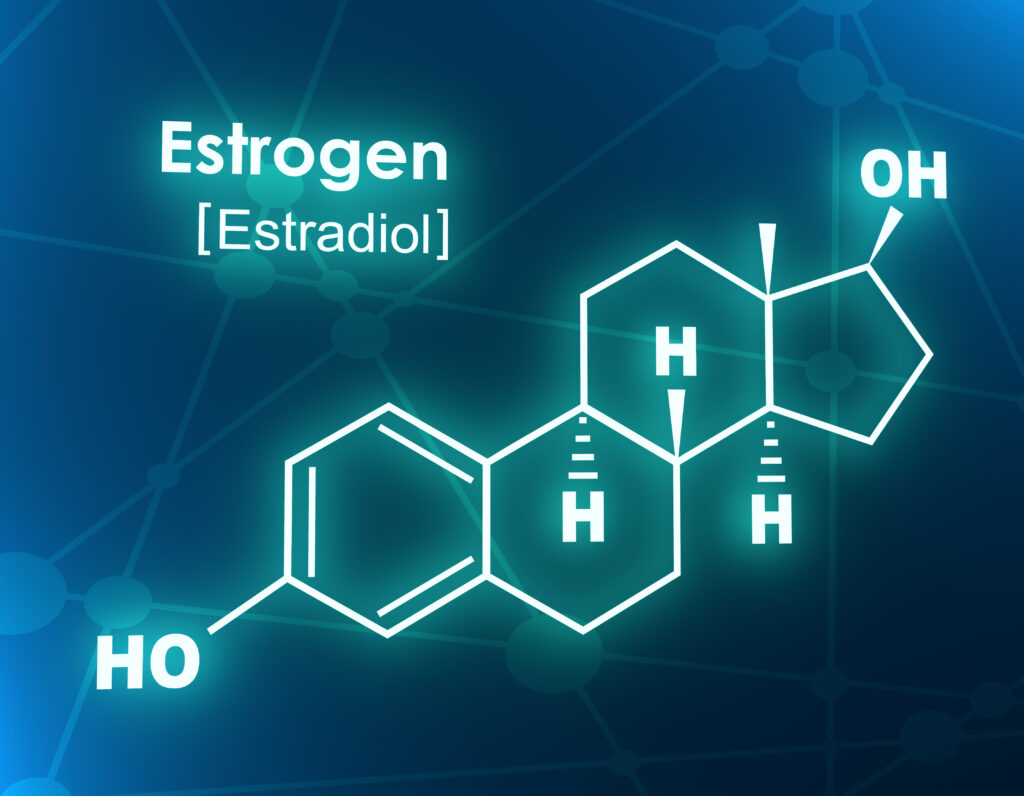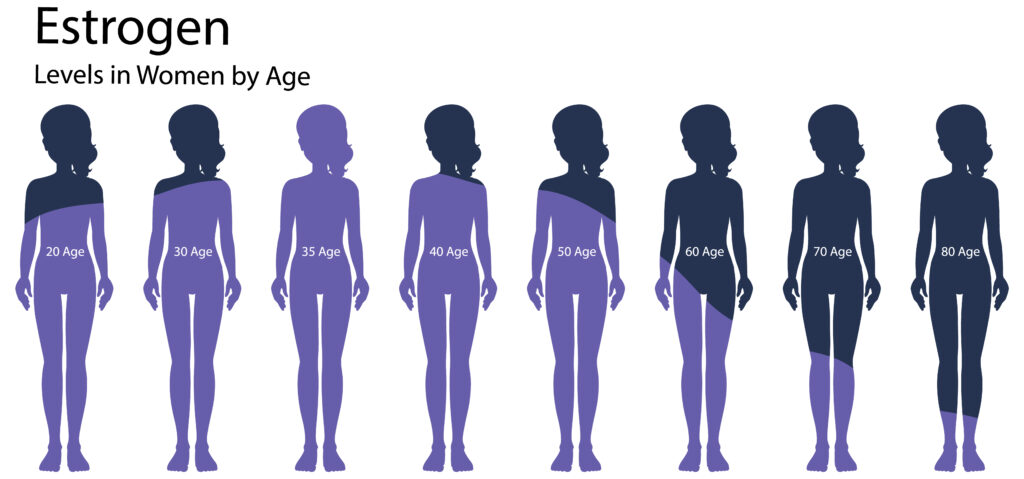Estrogen, like Progesterone, is a hormone that is vital to maintaining good health in women. It plays a crucial role in reproductive health, bone health, cardiovascular health, and brain health. Today I’m going to share the various ways in which estrogen is important for women’s health and discuss how you can support your health and well-being. We love estrogen, it gives us our curves and other fabulous aspects of femininity. But there’s more than just “sexy” to the benefits of estrogen.

Reproductive Health
Clearly, most women recognize that estrogen is responsible for regulating the menstrual cycle and reproductive health. It helps to regulate the growth and shedding of the endometrial lining in the uterus, which is necessary for menstruation. Estrogen is also necessary for the proper functioning of the ovaries, including the release of eggs during ovulation. Without adequate levels of estrogen, women may experience reproductive health issues such as irregular menstrual cycles, infertility, and even early menopause.
In fact, my work with women, and using the DUTCH Mapping Test, I’m amazed to see how often infertility, and severe hormonal symptoms, are related not just to hormone levels, but also to the improper timing of the rise and fall of the hormones.
Sexual Health
One of the first things that sexually active women seem to complain about when their estrogen begins to decrease is painful sex. Estrogen has a direct effect on the vaginal tissue by maintaining the thickness of the vaginal mucosa, the acidity of the vaginal environment and the moisture content of the vaginal lining. Women may complain of itching, burning and dryness, and also more frequent urinary tract infections due to the impact on urinary tract blood flow.
Beauty
As I stated above, many would say that estrogen is our beauty or even our sexy hormone. It creates our curves, our breasts as well as beautiful hair, skin and nails. When aging women complain of dry saggy skin and brittle hair, it may be due to low estrogen; these symptoms can be remedied however, with healthy estrogen diets, combined with a healthy diet and lifestyle.

Sleep
Years ago, I had no idea how much estrogen impacted sleep, until mine hit the wall. The impact was so severe it drove me to get help. Low estrogen can cause interruption in the sleep wake cycles, cause insomnia and even sleep apnea. Once these sleep challenges occur then changes in mood and many other symptoms may follow. If you’re sleep is off, this may be a missing link to investigate.
Bone Health
Estrogen is critical for maintaining strong and healthy bones. It plays a key role in bone metabolism, helping to regulate the process of bone resorption (breakdown) and formation. As women age and their estrogen levels naturally decline, this can lead to a decrease in bone density and an increased risk of osteoporosis. A study published in the Journal of Women’s Health found that estrogen therapy can indeed help to improve bone density and reduce the risk of fractures in women with osteoporosis. That’s a big deal. Even if you’ve neglected your hormones and bone loss has already begun to occur, estrogen support can still help prevent fractures.
Cardiovascular Health
During February, I wrote about the impact of hormones on heart health . Estrogen clearly plays a role in maintaining cardiovascular health. It has been shown to have a protective effect on the heart and blood vessels, helping to reduce the risk of cardiovascular disease. Estrogen helps to improve cholesterol levels by increasing levels of high-density lipoprotein (HDL) cholesterol and decreasing levels of low-density lipoprotein (LDL) cholesterol. It also helps to improve blood flow and prevent the buildup of plaque in the arteries. However, the relationship between estrogen and cardiovascular health is complex and varies among women, so it is important to discuss the risks and benefits of estrogen therapy with a healthcare provider.
Brain Health
Estrogen plays a role in maintaining brain health. It has been shown to have a protective effect on the brain, helping to reduce the risk of cognitive decline and Alzheimer’s disease. Estrogen helps to improve blood flow to the brain, which is important for delivering oxygen and nutrients to brain cells. It also helps to protect neurons from damage and promote the growth of new neurons. However, as with cardiovascular health, the relationship between estrogen and brain health is complex and varies among women. Here’s some great news again – even if cognitive decline has begun, estrogen replacement can be helpful. Be sure to choose Bioidentical though.

Estrogen levels of course naturally change through the age span, but what if your estrogen is low prematurely, as mine was. There are things that you can do naturally to support your estrogen levels before you begin replacement therapy.
In fact, I encourage women to start with healing the body, the gut, the brain through diet and lifestyle choices, perhaps adding supplementation, before they start supplementation. If, and when, supplementation is needed, then the hormones will actually have a better chance of working optimally.
Support Your Estrogen Naturally: Here’s a simple list of some things to do to support healthy estrogen levels naturally:
- Consume phytoestrogens: Phytoestrogens are naturally occurring plant compounds that have estrogen-like activity in the body. Foods such as soybeans, flax seeds, chickpeas, lentils, and alfalfa sprouts are good sources of phytoestrogens.
- Increase intake of cruciferous vegetables: Vegetables like broccoli, cauliflower, and kale contain compounds that help to balance hormones by supporting liver detoxification.
- Eat plenty of healthy fats – Omega fish oils, chia and flax seeds are all important to support healthy cell membrane production and healthy hormones. Be sure to eat Wild caught fish, to avoid the toxic load estrogens found in farmed fish.
- Exercise regularly: Regular exercise, especially strength training, can increase estrogen levels in women.
- Maintain a healthy weight: Being overweight or obese can lead to excess estrogen production in the body. Maintaining a healthy weight through a balanced diet and exercise can help regulate estrogen levels.
- Manage stress: High levels of stress can disrupt hormone balance, including estrogen levels. Incorporating stress-reducing practices such as meditation, yoga, or deep breathing can be helpful.
- Get enough sleep: Lack of sleep or poor sleep quality can lead to hormone imbalances, including low estrogen levels. Aim for 7-9 hours of sleep per night.
The Big Picture
You can take charge or your hormonal health! Yes, it may take some effort. Yes, It may take some changes, like the ones listed above. It may even take supplementation. However, I promise, the pay-off is immense! By starting today, you can begin to take some strides to improve your hormone health, your vitality and honestly, improve almost every aspect of your life when your hormones are balanced- really!
Next week, stay tuned as I write a hormonal imbalance that almost EVERY women is dealing with!

References
- Santen, R. J., et al. “Estrogen in breast cancer: a clinical perspective.” Clinical obstetrics and gynecology 48.3 (2005): 660-672.
- Burger, H. G., et al. “Dynamics of reproductive hormones in the menopausal transition.” European journal of endocrinology 151.suppl_3 (2004): U109-U115.
- Lindsay, R., et al. “Estrogen and prevention of osteoporosis in postmenopausal women.” American journal of medicine 119.4 (2006): S18-S24.
- Mendelsohn, M. E., and K. S. Karas. “The protective effects of estrogen on the cardiovascular system.” New England Journal of Medicine 340.23 (1999): 1801-1811.
- Henderson, V. W., et al. “Estrogen in the brain and Alzheimer’s disease.” Alzheimer’s Research & Therapy 5.2 (2013): 12.
- American College of Obstetricians and Gynecologists. “Hormone therapy.” ACOG Practice Bulletin No. 141 (2014): e1-e20.
- North American Menopause Society. “The 2017 hormone therapy position statement of The North American Menopause Society.” Menopause 24.7 (2017): 728-753.
